Jazib Mehmood, Student, Jamia Ahmadiyya International Ghana
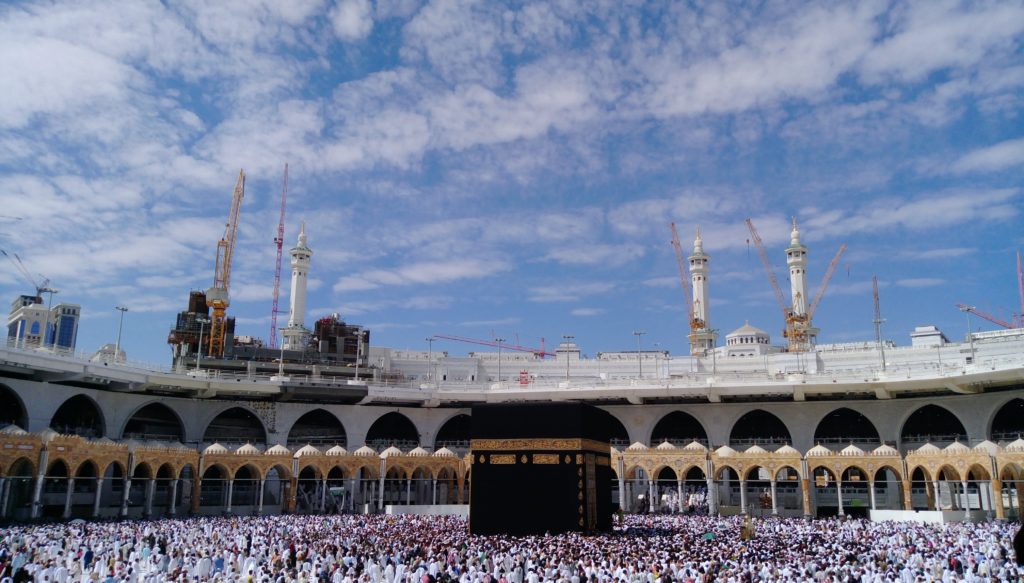
This week, Muslims from all over the world are flocking to the Holy City of Mecca, where nearly 4,000 years ago, Hazrat Abrahamas left his wife and infant son in the care of Allah. The Great Patriarch was the son of Terah. His father passed away when he was young, and his uncle Azar subsequently raised him. (Tafsir-e-Kabir, Vol. 7, p. 195)
It is worth remembering that wherever the Holy Quran mentions Hazrat Abraham’s father, it means his foster father; his uncle, as the word abun أَبٌ also means uncle in the Arabic language. (Tafsir-e-Kabir, Vol. 5, p. 528)
He was born in Ur, present-day Iraq and lived there but migrated by the command of Allah the Almighty. It is difficult to determine exactly when he lived. According to Hazrat Musleh-e-Maud’s calculations, Hazrat Abraham’s advent was about 2,200 to 2,500 years before the Holy Prophetsa, about 4,000 years ago. (Tafsir-e-Kabir, Vol. 8, p. 587 and Vol. 10, p. 106)
Hazrat Abrahamas is also the progenitor of the two great peoples; the Israelites and the Ishmaelites, who consider him a venerated personality. Hazrat Abraham’s real name was “Abram”. However, after the birth of Hazrat Ishmaelas, per Allah’s command, he came to be called Abraham, which means “father of a multitude” or “father of many nations.” (Haqaiq-ul-Furqan, Vol. 4, p. 412)
He also visited Mecca several times, where he had left Hazrat Ishmaelas from whose descendants the Seal of Prophets, the Holy Prophetsa was born. The progeny of Hazrat Isaacas, the second son of Hazrat Abrahamas, also multiplied exceedingly. From among them arose Prophet Mosesas, Davidas, Ezekielas, Danielas, Jesusas and many more. He is thus called Abul-Anbiya – Father of the Prophets – and Khalilullah – Allah’s special friend.
Hazrat Abrahamas is thus a very blessed figure in the annals of history. His progeny has impacted history for millennia. From either a religious or a geopolitical point of view, it cannot be denied that Hazrat Abrahamas occupies a special station in history. In the Holy Quran, Allah promised Hazrat Abrahamas:
إِنِّي جَاعِلُكَ لِلنَّاسِ إِمَامًا
“I will make thee a Leader of men.” (Surah al-Baqarah, Ch.2: V.125)
Consequently, in many parts of the world, he is considered an Imam and is remembered with great respect. In this verse, Allah declares that He made Hazrat Abrahamas such a being that people still follow his deeds and words. The ideal and eternal example of this are Muslims, whom Allah commands in the Holy Quran:
اتَّبِعْ مِلَّةَ إِبْرَاهِيْمَ حَنِيْفًا
“Follow the way of Abraham who was ever inclined to God.” (Surah an-Nahl, Ch.16: V.124)
What is the way of Abrahamas that we are commanded to follow? The Holy Quran tells us that it is his high moral attributes. The Holy Quran has presented Hazrat Abrahamas as a paragon of virtue and has purposely commanded Muslims to adopt his noble qualities.
The Holy Quran has explained this in another place as well:
قَدْ كَانَتْ لَكُمْ أُسْوَةٌ حَسَنَةٌ فِيْ إِبْرَاهِيْمَ
“There is a good model for you in Abraham.” (Surah al-Mumtahanah, Ch.60: V.5)
Hazrat Abraham’s spiritual status is also determined by the fact that besides the Holy Prophetsa, Allah speaks these words about him alone. The Holy Quran frequently speaks of his moral qualities and good example.
This article cannot encompass all the holy characteristics of Hazrat Abrahamas. However, a humble effort was made to include some of his principal virtues. Otherwise, upon reading the Holy Quran, we come to realise there is much more to his remarkable personality.
Prophet Abraham’s great oratory, argumentation and longing for the establishment of Tawhid (Divine Unity)
Interestingly, the word Abraham is said to come from “Abrama” أَبْرَمَ meaning the one who reinforces something. “Abraama” أَبْرَامَ is a good speaker and debater who can explain his meaning to others and render them speechless. The word, found in Hebrew, is also used in the Bible – although it is originally Arabic.
Hazrat Musleh-e-Maudra has argued in his commentary of the Holy Quran, Tafsir-e-Kabir, that Allah caused Hazrat Abrahamas to be named so by his father, thereby pointing to a hidden prophecy that he would possess great oratory skill, expressing his views in front of his opponents with such excellence that they would be rendered incapable of a retort. (Tafsir-e-Kabir, Vol. 5, pp. 264–265)
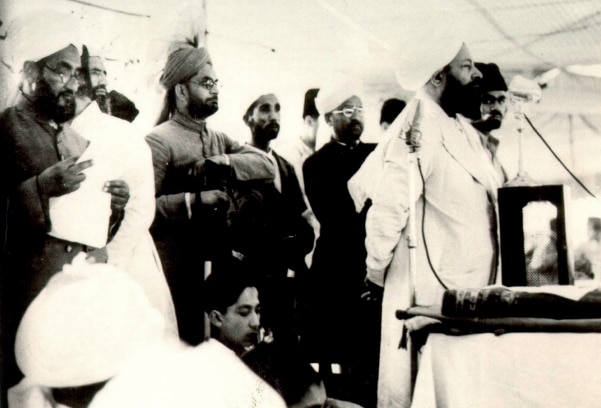
The Holy Quran has repeatedly paid homage to the efforts of Hazrat Abrahamas in establishing Divine Unity. The purpose of his advent in itself was to establish monotheism. Therefore, to accomplish such a monumental task, he prayed to Allah:
رَبِّ هَبْ لِي حُكْمًا
“My Lord, bestow wisdom on me.” (Surah ash-Shu‘ara Ch.26: V.84)
Allah, presenting Hazrat Abraham’s example to every preacher, has made it obligatory to offer the same prayer. Thus, Allah says in another place:
ادْعُ إِلِى سَبِيلِ رَبِّكَ بِالْحِكْمَةِ
“Call to the way of your Lord with wisdom.” (Surah an-Nahl, Ch.26: V.126)
The Holy Quran has also presented examples of Hazrat Abraham’s unique style of speech to illustrate that Allah granted him this attribute. The clearest example of this is in Surah al-Baqarah where Allah says:
أَلَمْ تَرَ إِلَى الَّذِي حَآجَّ إِبْرَاهِيمَ فِي رِبِّهِ أَنْ آتَاهُ اللهُ الْمُلْكَ إِذْ قَالَ إِبْرَاهِيمُ رَبِّيَ الَّذِي يُحْيِـي وَيُمِيتُ قَالَ أَنَا أُحْيِـي وَأُمِيتُ قَالَ إِبْرَاهِيمُ فَإِنَّ اللهَ يَأْتِي بِالشَّمْسِ مِنَ الْمَشْرِقِ فَأْتِ بِهَا مِنَ الْمَغْرِبِ فَبُهِتَ الَّذِي كَفَرَ وَاللهُ لاَ يَهْدِي الْقَوْمَ الظَّالِمِينَ
“Hast thou not heard of him who disputed with Abraham about his Lord, because Allah had given him kingdom? When Abraham said, ‘My Lord is He Who gives life and causes death,’ he said, ‘I also give life and cause death.’ Abraham said, ‘Well, Allah brings the sun from the East; bring it thou from the West.’ Thereupon the infidel was dumbfounded. And Allah guides not the unjust people.” (Surah al-Baqarah. Ch.2: V.259)
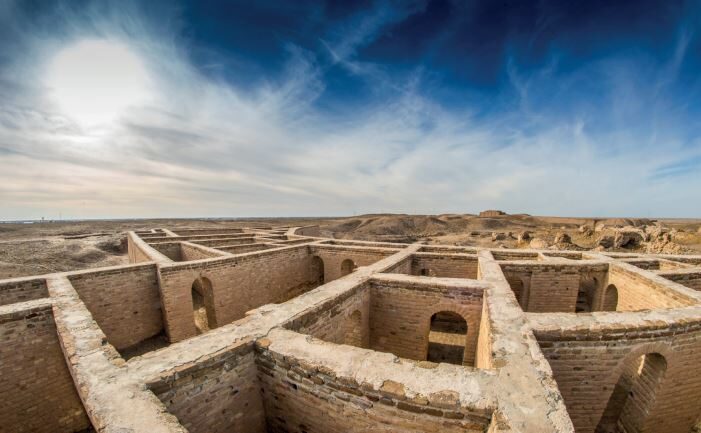
Here, we also learn that he did not shy away from describing the greatness and glory of Allah before the king. Bravely defying the conventional wisdom of the time, he presented his views and message clearly with no reserve.
His sons Hazrat Ishmaelas and Hazrat Isaacas, and grandson Hazrat Jacobas, all prophets, also lived in different areas where they were engaged in efforts to preach the message of Divine Unity. He sent Hazrat Isaacas to a settled land nearby to preach there. He also left Hazrat Ishmaelas in Mecca so that when that place was inhabited, the name of Allah the Almighty would echo there as well. Hazrat Musleh-e-Maudra referred to this example of his farsightedness as his long-term policy. (Tafsir-e-Kabir, Vol. 7, p. 193)
Did Hazrat Abraham lie about breaking the idols?
The Holy Quran, making special mention of his style of speech, also presents Hazrat Abraham’s rational arguments. For example, when he preached to his people, they refused to pay heed to him. Therefore, he once said to them:
وَتَاللهِ لَأَكِيدَنَّ أَصْنَامَكُم بَعْدَ أَن تُوَلُّوا مُدْبِرِينَ
“I will certainly plan against your idols after you have gone away and turned your backs.” (Surah al-Anbiya, Ch.21: V.58)
Accordingly, he went to his family’s shrine, a popular shrine in the area, and broke all the idols except the biggest one – which he very wisely left. When people found out about this, their minds naturally turned to Hazrat Abrahamas, who had already said he would do something of this sort.
The Quran says:
قَالُوا أَأَنتَ فَعَلْتَ هَذَا بِآلِهَتِنَا يَا إِبْرَاهِيمُ قَالَ بَلْ فَعَلَهُ كَبِيرُهُمْ هَذَا فَاسْأَلُوهُمْ إِن كَانُوا يَنطِقُونَ
“Then they said to Abraham, ‘Is it thou who hast done this to our gods, O Abraham?’ He replied, ‘Aye, somebody has surely done this. Here is the chief suspect. But ask them if they are capable of speaking.’” (Surah al-Anbiya, Ch.21: V.63-64)
His style of reasoning here deserves special praise. Some, God forbid, consider him a liar. However, it would have been highly uncharacteristic of him, a chosen prophet of Allah, to do such a thing. Then, such an allegation is baseless because he had openly declared that he would do something to their idols. Moreover, before narrating this incident, Allah, praising Hazrat Abrahamas, had said:
وَلَقَدْ آتَيْنَا إِبْرَاهِيمَ رُشْدَهُ مِن قَبْلُ وَكُنَّا بِه عَالِمِينَ
“And before this We gave Abraham his guidance, and We knew him well. (Surah al-Anbiya, Ch.21: V.52)
Therefore, it is clear from context that Hazrat Abrahamas made a very logical argument. The result of this effective argument was that they did not believe that the biggest idol had broken all the other idols. Their refusal to accept such a ludicrous idea rendered their belief false. To that effect, Allah narrates in the following verses:
فَرَجَعُوا إِلَى أَنفُسِهِمْ فَقَالُوا إِنَّكُمْ أَنتُمُ الظَّالِمُونَ ثُمَّ نُكِسُوا عَلَى رُؤُوسِهِمْ لَقَدْ عَلِمْتَ مَا هَؤُلَاء يَنطِقُونَ
“Then they turned towards one another and said, ‘You yourselves are surely in the wrong.’ And their heads were made to hang low for shame and they said, ‘Certainly thou knowest well that these do not speak.’” (Surah al-Anbiya, Ch.21: V.65-66)

Explaining this view, Hazrat Khalifatul Masih IVrh writes:
“Some translators avoid literal translation of this verse fearing that this would present Abraham as a liar. Obviously, it was not the big idols who had smashed the smaller ones but it was Abraham himself who had done it. […]
“It should be noted, however, that it was not a misstatement but a powerful style of argument. Sometimes a thing is too obvious for anybody to believe and a statement to that effect is never understood as a wilful attempt to mislead others but considered an exposition of the inherent absurdity of a situation.
“We believe that Abraham did make that statement without the slightest intention of misleading them but only by way of a powerful argument against the falsity of their belief. This is exactly how they took it. Having heard Abraham, none of them retorted by calling him a liar. But according to the Holy Quran they were introspectively forced to realize the folly of their belief.” (Footnote under Surah al-Anbiya, Ch.21: V.64, Holy Quran English translation by Hazrat Maulvi Sher Alira, 2004 edition)
The power of his speech
His words were also very effective because whatever he claimed, he proved with his practical example. Admonishing his people, he said:
إِنَّمَا تَعْبُدُونَ مِن دُونِ اللهِ أَوْثَانًا وَتَخْلُقُونَ إِفْكًا إِنَّ الَّذِينَ تَعْبُدُونَ مِن دُونِ اللهِ لَا يَمْلِكُونَ لَكُمْ رِزْقًا فَابْتَغُوا عِندَ اللهِ الرِّزْقَ
“You only worship idols beside Allah, and you forge a lie. Those whom you worship beside Allah have no power to provide sustenance for you. Then seek sustenance from Allah.” (Surah al-Ankabut, Ch.29: V.18)
He showed a practical example of this when he left his wife and child in a barren land. He only prayed to Allah to provide for them. In this way, he proved Allah to be the Master of sustenance.
His practical example of Allah’s magnificence was also shown when he was thrown into the fire. Hazrat Lotas saw that Hazrat Abrahamas, who had been passionately preaching tawhid and wonders of Allah, was miraculously saved from the fire his people had thrown him in. He was among those who accepted him, impressed by the personal relationship Hazrat Abrahamas enjoyed with Allah. He rose in faith to the extent that Allah granted him Prophethood. (Tafsir-e-Kabir, Vol. 7, p. 619)
Narrating an incident of Hazrat Abrahamas in the Holy Quran, Allah alludes to his habit of thinking about arguments in favour of His existence and Omnipotence. Allah says:
وَإِذْ قَالَ إِبْرَاهِيمُ لأَبِيهِ آزَرَ أَتَتَّخِذُ أَصْنَامًا آلِهَةً إِنِّي أَرَاكَ وَقَوْمَكَ فِي ضَلاَلٍ مُّبِينٍ
“And remember the time when Abraham said to his father, Azar: ‘Dost thou take idols for gods? Surely, I see thee and thy people in manifest error.’” (Surah al-An‘am, Ch.6: V.75)
Here, Allah also hints that Hazrat Abrahamas frequently argued with his uncle and detested polytheism from a young age. (Tafsir-e-Kabir, Vol. 5, p. 531)
Then, Allah says:
وَكَذَلِكَ نُرِي إِبْرَاهِيمَ مَلَكُوتَ السَّمَاوَاتِ وَالأَرْضِ وَلِيَكُونَ مِنَ الْمُوقِنِينَ
“Thus did We show Abraham the kingdom of the heavens and the earth, that he might be of those who believe.” (Surah Al-An‘am, Ch.6: V.76)
This verse also means that Allah granted him knowledge and taught him universal wisdom. In light of the aforementioned verses, Hazrat Khalifatul Masih IVrh has remarked that Hazrat Abrahamas would ponder over his opponents’ arguments in the presence of his Lord and think about how to show them the right path. (Friday Sermon, 3 June 1983, Khutbat-e-Tahir, Vol. 2, pp. 308–309)
The result is best described in the words of the Holy Quran. Allah says:
وَجَعَلَهَا كَلِمَةً بَاقِيَةً فِي عَقِبِهِ لَعَلَّهُمْ يَرْجِعُونَ
“And He made it [Divine Unity] a byword to last among his posterity, that they might turn to God.” (Surah Az-Zhukhruf, Ch.43: V.29)
Hazrat Abrahamas was a firm believer in Divine Unity and preached it to his posterity with such sincerity and diligence that this belief came to stay among his generations for a long time. His sons, grandsons and great-grandsons all believed in the One God. The greatest champion of Divine Unity, the Holy Prophetsa was also from his progeny.
Then, he thought of strong arguments and proved the stars, moon and sun to be false gods. The Holy Quran has narrated his arguments in detail in Surah al-An‘am.
Extraordinary examples of trust in Allah and perseverance in trials
The Holy Quran also mentions his trials and his steadfastness in these trials in detail. It is in remembrance of his steadfastness that Muslims perform Hajj today. Allah has also commanded able-bodied Muslims to imitate his sacrifice on Eid-ul-Adha.
The Holy Quran mentions his afflictions in the following words:
وَإِذِ ابْتَلَى إِبْرَاهِيمَ رَبُّهُ بِكَلِمَاتٍ فَأَتَمَّهُنَّ
“And remember when his Lord tried Abraham with certain commands which he fulfilled.” (Surah al-Baqarah, Ch.2: V.125)
The Holy Quran has mentioned these afflictions in various places. For example, as mentioned, Hazrat Abrahamas encountered many difficulties during his preaching efforts. When he was arguing with his people because he had proven their idols false gods, his people said:
ابْنُوا لَهُ بُنْيَانًا فَأَلْقُوهُ فِي الْجَحِيمِ
“Build for him a structure and cast him into the fire.” (Surah al-Saffat, Ch.37: V.98)
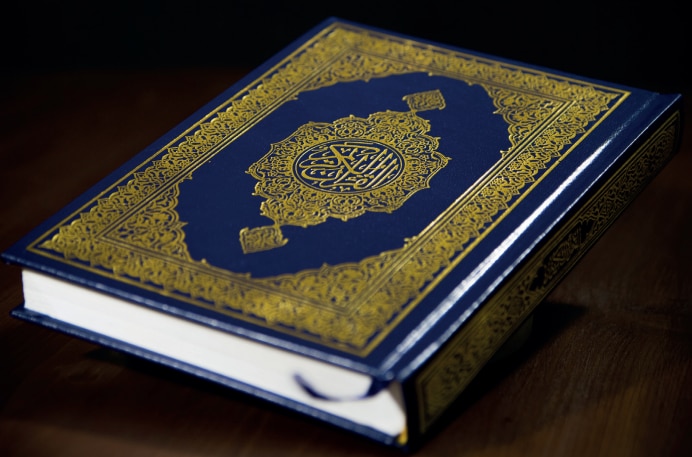
So, a fire was kindled for him and he was thrown into it. But he had complete faith in Allah the Almighty. Whereas human nature demanded that he cry out or shout for help, the words on his lips were:
حَسْبِيَ اللهُ وَنِعْمَ الْوَكِيْلُ
“Allah is sufficient for me, and He is an excellent guardian.” (Sahih al-Bukhari, Kitab at-Tafsir, Hadith 4564)
Speaking of Hazrat Abraham’s trust in Allah, the Promised Messiahas states:
“When the disbelievers were casting Abrahamas into the fire, the angels came to Abrahamas and asked him whether he needed anything. Abrahamas responded by saying:
بَلَى وَلٰكِنْ إِلَيْكُمْ لَا
“Meaning, Yes; but though I am in need, there is no need to present it before you. The angels responded: ‘Alright, then supplicate before God Almighty.’ To this, Abrahamas said:
عِلْمُه مِنْ حَالِيْ حَسْبِيْ مِنْ سَوَالِيْ
“In other words, He is so well aware of my state that there is no need for me to submit a request to Him.” (Malfuzat [English], Vol. 3, p. 105)
Then, Hazrat Abrahamas had aged, but he had no children. So, he prayed:
رَبِّ هَبْ لِي مِنَ الصَّالِحِينَ
“My Lord, grant me a righteous son.” (Surah al-Saffat: Ch.37: V.101)
Accepting his prayers, Allah gave him a humble son. But when he was born, God commanded him to leave his wife and son in a barren desert. Although this was a great trial for him, he obeyed this order without any protest and prayed, with great perseverance:
رَّبَّنَا إِنِّي أَسْكَنتُ مِن ذُرِّيَّتِي بِوَادٍ غَيْرِ ذِي زَرْعٍ عِندَ بَيْتِكَ الْمُحَرَّمِ رَبَّنَا لِيُقِيمُواْ الصَّلاَةَ فَاجْعَلْ أَفْئِدَةً مِّنَ النَّاسِ تَهْوِي إِلَيْهِمْ وَارْزُقْهُم مِّنَ الثَّمَرَاتِ لَعَلَّهُمْ يَشْكُرُونَ
“‘Our Lord! Surely I have settled some of my offspring in a barren valley near your honourable house. Our Lord! So that they may establish prayer. So incline the hearts of the people towards them and provide them with fruits so that they may give thanks.’” (Surah Ibrahim, Ch.14: V.38)
This prayer was the result of his perfect trust. Otherwise, it seems unreasonable to hope for food in such a barren land.
Then, when his son Ishmaelas was six or seven, Hazrat Abrahamas said:
يَا بُنَيَّ إِنِّي أَرَى فِي الْمَنَامِ أَنِّي أَذْبَحُكَ
“O my dear son, I have seen in a dream that I am slaughtering thee.” (Surah al-Saffat, Ch.37: V.103)
Hazrat Abrahamas had only one son, born in miraculous circumstances considering his age. However, he was ready to follow the command of Allah.
The Holy Quran narrates:
فَلَمَّا أَسْلَمَا وَتَلَّهُ لِلْجَبِينِ وَنَادَيْنَاهُ أَنْ يَا إِبْرَاهِيمُ قَدْ صَدَّقْتَ الرُّؤْيَا إِنَّا كَذَلِكَ نَجْزِي الْمُحْسِنِينَ إِنَّ هَذَا لَهُوَ الْبَلَاءُ الْمُبِينُ
“And when they both submitted [to the Will of God], and he had thrown him down on his forehead, We called to him: ‘O Abraham, Thou hast indeed fulfilled the dream.’ Thus indeed do We reward those who do good. That surely was a manifest trial.” (Surah al-Saffat, Ch.37: V.104-107)
Allah put him through so many afflictions that it is beyond imagination. Allah did not do this to cause him pain, but to show the world his level of faith and loyalty to Him. Accordingly, he showed incredibly high examples of perseverance, which are recorded in the Holy Quran until the Day of Judgment, for Allah intended to make him a shining example for future generations. Allah the Almighty consequently stated:
إِنِّي جَاعِلُكَ لِلنَّاسِ إِمَامًا
“I will make thee a Leader of men.” (Surah al-Baqarah, Ch.2:V.125)
Mentioning that he passed these trials very well, Hazrat Musleh-e-Maudra translates this verse in this way:
“O Abraham! You were a prophet to your people, but since you proved steadfast in trials, and you obeyed my command with great courage, settled your wife and child in a forest where neither a drop of water nor a leaf of grass grew and accepted your death and your family’s, I will also reward you. And this event of yours will remain as a model for people of the whole world until the Day of Judgment. And whenever the world is taught to be steadfast in trials and tribulations, then this event of yours will be presented as a model.” (Tafsir-e-Kabir, Vol. 2, p. 160)
Describing the rewards of his steadfastness, the Promised Messiahas says:
“It was by God’s grace that the son survived; otherwise, Abraham [as] [thought] he had slaughtered him. That is why he got the title of Sadiq [the truthful]. And it is written in the Torah that God said, ‘O Abraham, look at the stars in the sky. Can you count them? In the same way, your children will be uncountable.’ It was a momentary pain that passed. What a great reward [he received] as a result! Today all the Sadats and the Quraish and the Jews and other nations call themselves the children of Abraham[as].” (Malfuzat, Vol. 5, pp. 416–417, 1988 Edition)
Divine help
Allah never left him helpless. For example, where his God-given style of speech is mentioned, there is also great proof of Divine help in his favour. In the Holy Quran, Allah promises, before narrating the incident of Hazrat Abraham’s discussion with Nimrod,
اللهُ وَلِيُّ الَّذِينَ آمَنُواْ يُخْرِجُهُم مِّنَ الظُّلُمَاتِ إِلَى النُّوُرِ
“Allah is the friend of those who believe. He brings them out of every kind of darkness into light.” (Surah al-Baqarah, Ch.2: V.258)
By bringing the incident of Hazrat Abraham’s discussion with Nimrod after this verse, Allah presents proof of this promise. His style of speech is one of the principal proofs of Allah’s help for His messengers given in the Holy Quran. Allah supported him throughout his life, even against the reigning monarch of the time. (Tafsir-e-Kabir, Vol. 2, p. 594)
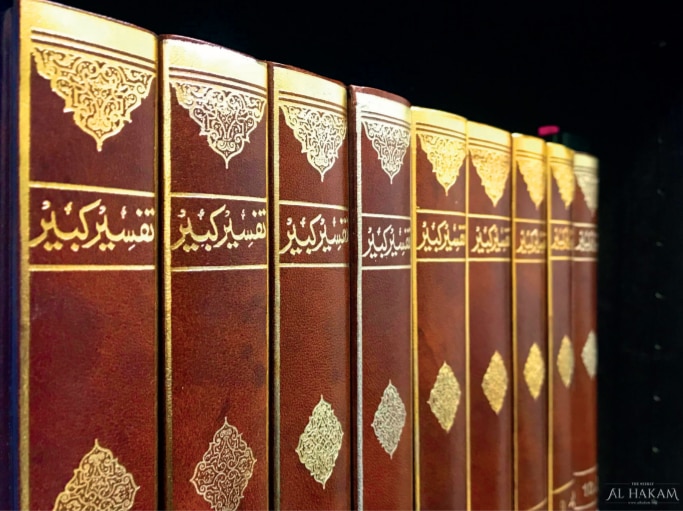
Evidence of this Divine help can be seen on many occasions in the life of Hazrat Abrahamas. As previously mentioned, his opponents once had him thrown in fire. However, Allah says in the Holy Quran that at that time He said:
يَا نَارُ كُونِي بَرْدًا وَسَلَامًا عَلَى إِبْرَاهِيمَ
“Turn cold, O fire, and be a source of peace for Abraham.” (Surah al-Anbiya, Ch.21: V.70)
Explaining the reality of this fire, Hazrat Musleh-e-Maudra narrated an incident that occurred during the time of the Promised Messiahas:
“When Dharmapal [a Hindu] raised this objection that if the fire turned cold for Abrahamas, then why did it not turn cold for others? On this, Khalifatul Masih I[ra] replied that ‘nar’ [نَار] does not mean physical fire but rather means the fire of opposition.
“Then, the Promised Messiahas said, ‘What is the need for this interpretation? God has also called me Abraham. If people do not understand how the fire turned cold for Abraham[as], they should throw me in a fire and see if I get out of the fire safely or not.’” (Friday Sermon 16 January 1959, Khutbat-e-Mahmud, Vol. 9, pp. 318–319)
Then, on another occasion, Hazrat Musleh-e-Maudra, while interpreting this verse, said:
“One of the meanings of يَا نَارُ كُونِي بَرْدًا [turn cold, O fire] is that Abraham[as] occupied such a station that We decreed that no harm should come to him in Our way. His faith is so strong that he gladly accepts whatever affliction befalls him and is pleased that he has another opportunity to sacrifice for God Almighty.
“Hell becomes impossible for such people. For he who begins to feel comfortable in pain, what harm can [his] enemies cause him? If God Almighty casts him into Paradise, it will be Paradise for him. And if his enemies cast him into Hell, it will be [like a] Paradise for him. If they torment him, it is a source of ease for him. […] the torment of others will only create Paradise. These are the people who have victory [written] on their foreheads and these are the people who inherit the bounties of Allah the Almighty.” (Friday Sermon, 28 September 1945, Khutbat-e-Mahmud, Vol. 26, pp. 388–389)
In these afflictions, Allah the Almighty protected him with His help and supported him at every step. The sight of Divine support in his life is also perfect proof of his nearness to God. The Promised Messiahas mentions these scenes and says:
“Since he [Abrahamas] was truthful and a loyal servant of God, therefore God helped him at the time of every tribulation. When he was cast into the fire unjustly, God made the fire cool for him. Similarly, when an unscrupulous king had ill intention towards his wife, God afflicted those hands with which he intended to fulfil his impure intentions. And then when Abraham, under Divine command, left his beloved son, who was Ismael [Ishmael], in such mountainous terrain as had neither food nor water, God produced for him water and food out of nowhere.” (The Philosophy of Divine Revelation [Haqiqatul-Wahi], pp. 64–65)
Noble attributes
Speaking of Hazrat Abrahamas, the Holy Quran declares:
إِنَّ إِبْرَاهِيمَ كَانَ أُمَّةً قَانِتًا لِلّهِ حَنِيفًا وَلَمْ يَكُ مِنَ الْمُشْرِكِينَ
“Abraham was indeed a paragon of virtue, obedient to Allah, ever inclined to Him, and he was not of those who set up equals to God.” (Surah an-Nahl, Ch.16: V.121)
Hazrat Musleh-e-Maudra has taken six qualities of Hazrat Abrahamra from this verse:
- Hazrat Abrahamas was a teacher of good; he taught the world goodness.
- He was jami-ul-khair [embodiment of good]. Allah the Almighty gave him the title of ummah. This meant that he possessed all kinds of moral virtues.
- His nature hid the forces of tremendous growth from which it was possible to create nations.
- He was qanit; he was obedient to Allah and constantly prayed to Him.
- He was hanif; he had tremendous power and never deviated from the path of truth.
- He was not polytheistic and firmly adhered to monotheism. (Tafsir-e-Kabir, Vol. 4, p. 267)
Then, Allah says in the following verse:
شَاكِرًا لِّأَنْعُمِهِ اجْتَبَاهُ وَهَدَاهُ إِلَى صِرَاطٍ مُّسْتَقِيمٍ
“Grateful for His favours; He chose him and guided him to a straight path.” (Surah an-Nahl, Ch.16: V.122)
Hazrat Abrahamas was grateful. He did not attribute his virtues to himself but considered them as blessings bestowed by Allah. As a result, Allah chose him and showed him the loftiest paths of guidance.
In these verses, Allah instructs Muslims to adopt the noble attributes of Hazrat Abrahamas. Therefore, Hazrat Musleh-e-Maudra says that Allah states that we should be like Hazrat Abrahamas and seek to emulate his qualities. The result will be that Allah will treat us as He treated Hazrat Abrahamas. (Tafsir-e-Kabir, Vol. 4, p. 269)
What was that treatment? The next verse tells us:
وَآتَيْنَاهُ فِي الْدُّنْيَا حَسَنَةً وَإِنَّهُ فِي الآخِرَةِ لَمِنَ الصَّالِحِينَ
“And We bestowed on him good in this world, and in the Hereafter he will surely be among the righteous.” (Surah an-Nahl, Ch.16: V.122)
Three prophets were born from his seed in his own life. Many more were sent from his progeny to the Israelites. God bestowed him with two sons. Both were pure. Both became prophets. Allah the Almighty also decreed that He would also send the Holy Prophetsa from Hazrat Abraham’s descendants. In this way, he was granted many rewards in this world. (Tafsir-e-Kabir, Vol. 7, p. 572)
Finally, Allah the Almighty says:
ثُمَّ أَوْحَيْنَا إِلَيْكَ أَنِ اتَّبِعْ مِلَّةَ إِبْرَاهِيمَ حَنِيفًا وَمَا كَانَ مِنَ الْمُشْرِكِينَ
“And now We have revealed to thee, saying, ‘Follow the way of Abraham who was ever inclined to God and was not of those who set up equals to Him.’” (Surah an-Nahl, Ch.16: V.122)
Hazrat Khalifatul Masih Ira has also written that the literal meaning of the word Abraham is “The father of believers and saints.” (Haqaiq-ul-Furqan, Vol. 3, p. 335)
So here, Allah said in clear words that if Muslims adopted these noble attributes, they would surely be the recipients of such rewards.
Allah told the Holy Prophetsa and his ummah many stories of prophets in the Holy Quran. However, Muslims have been explicitly asked to follow the way of Hazrat Abrahamas. Where all prophets of Allah are the torches that light up our path to Him, Hazrat Abrahamas occupies a special station in Islam.
(To be continued)

